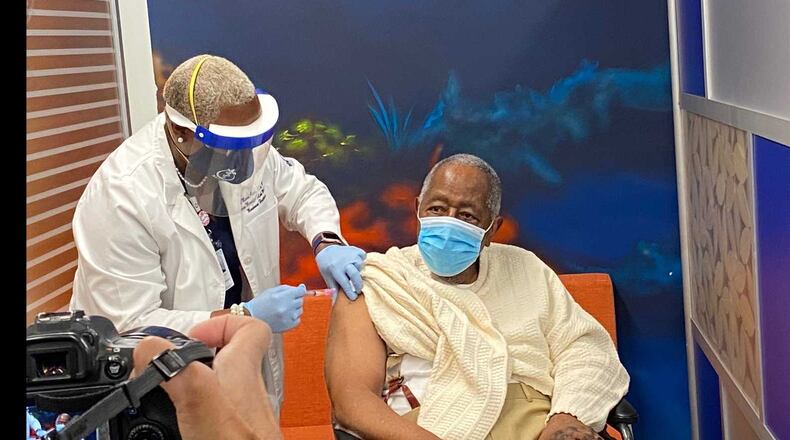When Hank Aaron and other African American leaders invited reporters to watch them receive COVID-19 immunization shots on Jan. 5, the baseball legend said he did so to help spread the word to millions that the vaccine is safe.
“It felt good,” Aaron said afterward at the Morehouse School of Medicine, where the event was held.
Now, just over two weeks later, public health experts and some of the Black leaders with Aaron that day worry that an event that drew so much publicity could inadvertently serve to undermine confidence in the vaccine. Within minutes of news breaking Friday morning of the baseball great’s death, those with doubts about the vaccine turned to social media to try to draw a connection to Aaron’s recent immunization.
That worries Joe Beasley, one of the activists who received the Moderna vaccine shot alongside Aaron. “I hope this won’t have a chilling effect on our people,” said Beasley, 84. “We can’t afford it because too many people are dying (from COVID-19).”
A cause of death was not announced, but the Braves said Aaron died peacefully in his sleep.
Public health officials have been girding for weeks to fend off rumors and questions about vaccine safety, especially in the age of social media where unsubstantiated claims can be challenging to tamp down. In some parts of Georgia, fewer than half of health care workers and nursing homes aides are getting vaccinated out of safety concerns.
The vaccine reluctance is fueled in part by the speed with which the Moderna and Pfizer vaccines were developed and authorized, although the clinical trials that took place last year involved tens of thousands people and were approved by the U.S. Food and Drug Administration.
“All the data in these huge clinical trials did not support a role for vaccine in causing death,” said Dr. Walter A. Orenstein, a former director at the CDC’s immunization program and a professor at the Emory Vaccine Center. “My fear is people will act emotionally and not get vaccinated....My fear is that people misinterpret this and say, ‘Aha, see the vaccine is dangerous,’ when in fact there’s no science data to support that hypothesis at all.”
Michael Osterholm, director of the Center for Infectious Disease Research and Policy at the University of Minnesota, said the proximity of Aaron’s death to such a highly publicized vaccine is a “teaching moment” for public health officials to use facts to calm people’s fears. He said in a program where millions of older Americans and those with serious health conditions are being vaccinated, some are going to die of heart attacks, strokes and other causes that have nothing to do with a vaccine.
“We have to have the public understand that all of these events in life occur on a routine basis,” he said. “And that, coincidentally, they’re going to occur in the same time period that a vaccine would occur...And they have nothing to do with the vaccination any more than if they had, you know, taken a ride in a car the day before — the car had nothing to do with it.”
The World Health Organization this week released findings after a series of deaths in elderly people with severe illness in nursing homes in Norway caused concerns about vaccination, but the review didn’t find evidence that the Pfizer vaccine caused the deaths.
Dr. Carlos del Rio, an infectious disease expert at Emory School of Medicine, said the much bigger risk to frail, older people is the coronavirus. “We have 4,000 (COVID-19) deaths every day in our country,” he said. “We need to put things in perspective. I’m more afraid of COVID than I am the vaccine.”
Aaron, who was 86, suffered from arthritis and had a partial hip replacement after falling in 2014, and he used a wheelchair at the Morehouse event.
Andrew Young, a former ambassador and Atlanta mayor, got his vaccine shot that day with Aaron. Young and others interviewed Friday said they have not had any severe reactions to the shot. Young, 88, who worked alongside the Rev. Martin Luther King Jr. during the civil rights movement, said he’s taken vaccines all his life and remains confident in their safety.
Young said of Aaron, “It was his time, and he has made a great contribution to this city and nation and to baseball as well.”
The Latest
Featured




